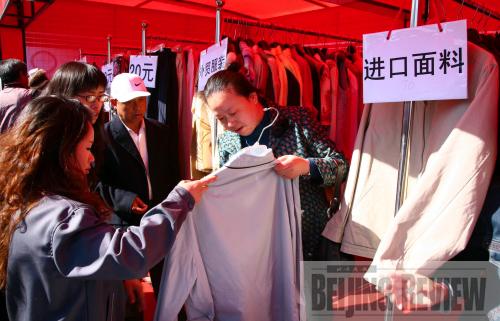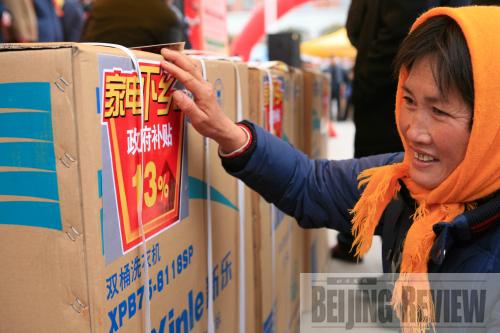|
 |
|
BUY MORE: Vendors at a market in suburban Beijing offer discounts on clothing to attract buyers (BU XIANGDONG) |
A myriad of policies that the Chinese Government introduced to boost rural spending have finally started to pay off. According to the National Bureau of Statistics (NBS), rural areas posted spending growth higher than in urban areas in April for the first time in China.
Total retail sales of consumer goods in rural areas increased 16.9 percent in the first four months of this year, or 2.8 percentage points more than in urban areas, according to NBS statistics. Analysts anticipate the trend will continue, although the disparity narrowed by 0.6 percentage points in May.
 |
|
AFFORDABLE NOW: A farmer in Xinghua, Jiangsu Province, selects from a variety of government-subsidized washing machine models to find the one most suitable to her needs GU (XIANGZHONG) | China began to calculate total retail sales of consumer goods in rural and urban areas separately in 1990. For the next 18 years, total urban spending always surpassed that of rural areas.
Now rural spending on consumer goods has grown faster than in urban areas for the first time, which indicates the rural consumer market will play a larger role in revving up the national market, according to an online announcement by the Market System Development Department of the Ministry of Commerce (MOFCOM) on June 16.
Why farmers buy more
The de facto purchasing power of farmers is far lower than that of urban dwellers in China, because of the wealth gap between urban and rural areas. So what accounts for the rapid growth in rural spending, and how is rural consumer spending growing faster than in urban areas?
The fact that rural spending on consumer goods grew faster than urban spending indicates that the policies the Central Government has adopted to support and benefit agriculture, rural areas and farmers have taken effect, said Huang Guoxiong, a professor of economics at Renmin University of China, in a Xinhua News Agency report.
In the past few years, the Chinese Government has adopted a series of measures to increase subsidies for grain planting and agricultural machinery purchases, enhance development-oriented poverty relief efforts and expand the new rural cooperative medical scheme to cover more areas. All these measures have helped boost farmers' confidence to spend more by increasing their incomes while relieving their worries.
NBS statistics indicate the per-capita cash income for rural residents in the first quarter stood at 1,622 yuan ($238), up 8.6 percent from the previous year. The Central Government will allocate 716 billion yuan ($105 billion) this year to support agriculture, rural areas and farmer-related development, an increase of 120.6 billion yuan ($17.7 billion), up 20.2 percent from the previous year.
The Central Government also said it would continue to increase minimum grain purchase prices and all kinds of agriculture-related subsidies in order to increase farmers' incomes.
While helping to boost farmers' incomes, the Central Government has introduced schemes to subsidize their purchases of home appliances and cars. By the end of April, more than 132,000 home-appliance stores were participating in the scheme in all counties and townships nationwide. From January to April, 4.46 million home appliances were sold under the scheme, yielding 6.8 billion yuan ($1 billion) in sales.
| 